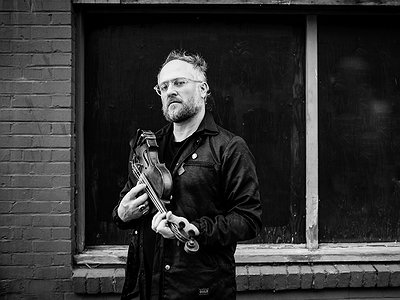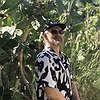Part 1
Name: Jesse Zubot
Nationality: Canadian
Occupation: Composer, improviser, violinist, producer, engineer
Current release: Jesse Zubot is one of the artists featured on the Josh Zubot Strings' eponymous debut album, out via Drip Audio. He also participated in the recording and upcoming live performance of the new Darius Jones release fLuXkit Vancouver (i̶t̶s̶ suite but sacred).
Recommendations: Alice Coltrane – Universal Consciousness – There is just something about this album that feels endlessly otherworldly and is something that always sounds fresh and weirdly psychedelic to me.
John Fahey … can’t really pick a specific album, but he has been one of my bigger influences in the last few decades as he was a complete original. I strive to keep that feeling of originality with everything I do in music.
If you enjoyed this Jesse Zubot interview, and would like to find out more about his music, visit his official homepage. He is also on twitter.
Over the course of his career, Jesse Zubot has played with a wide range of artists, including Joshua Zubot, Gordon Grdina, JOYFULTALK, and Jason Sharp.
[Read our Joshua Zubot interview]
[Read our Gordon Grdina interview]
[Read our Jason Sharp interview]
[Read our JOYFULTALK interview]
Do you think that some of your earliest musical experiences planted a seed for your interest in improvisation?
Yes, for sure. When I was a kid, my father listened to a lot of free-jazz by artists such as Ornette Coleman, John Coltrane, Eric Dolphy and his favourite musician was Rahsaan Roland Kirk.
My father was a drummer and multi-instrumentalist. He would perform improvised drum solos for me and my friends after school in the basement. He also was a blues harmonica player so we were constantly hearing blues harp solos and Howlin’ Wolf blaring through the house.
So yeah, improvisation was all around when I was a very young kid and it was deeply implanted in my psyche and being.
When did you first consciously start getting interested in musical improvisation? Which artists, teachers, albums or performances involving prominent use of improvisation captured your imagination in the beginning?
I became interested in improvisation around the age of 12 or 13, I think. Our father built a music room in the house that we grew up in on a farm in an extremely rural area in south west Saskatchewan (Canada). My brother, dad and I were constantly jamming in that room on guitars, drums, saxophones, synthesizers, bass ... and it was mainly all improvisatory.
It is hard to pick out a specific artist, teacher or album that captured my imagination. I think it was just everywhere … growing up in a home with old school blues, free-jazz, Led Zeppelin and folk music blaring through the speakers everyday … it was impossible not to be thinking about guitar solos and sax solos and things.
When I was a teenager I learned a ton of guitar solos on my Ibanez shredder guitar. I went through a severe phase of listening to people like Steve Vai, Vernon Reid, Frank Zappa, Jimmy Page, etc. Just learning how to play solos on the guitar, which is a form of improvisation in itself.
Later, I moved to Vancouver and went to Capilano University to study jazz, but was more interested in other forms of music at this point. I spent quite a few years working in the folk music world and then decided to start taking free improvising more seriously once I became a professional musician.
Vancouver had a really great improvised music scene in the early 90s, when I moved there. Vancouver musicians such as François Houle, Tony Wilson, Peggy Lee, Dylan van der Schyff and Ron Samworth really opened my ears into how to take improvising to far and distant places.
Then I started listening to folks like Derek Bailey, Evan Parker, Peter Brötzmann, William Parker, John Zorn, Anthony Braxton and also artists that were incorporating improvised music within more conventional forms such as Laurie Anderson, Bill Frisell, Marc Ribot, Meredith Monk and electronic artists like Squarepusher, Autechre, Mira Calix, etc.
In terms of your personal expression and the experience of performance, how does playing solo compare to group improvisations?
Playing solo can be similar to group improvisations and it can also be very different. I like both, but in general after developing my improvisational ways, I feel like I get to a similar place of expression doing both. After working as an improvisor for many years, you just wanna get to that feeling of creating something that matters.
With group improvisations, you are obviously trying to be respectful and listen to what is going on around you with the other musicians, sometimes supporting, sometimes blaring through it, sometimes leading, etc … because of that, it is just gonna be different than solo.
But I have to say, I have a pretty deep love for solo improvisation. I find it can be quite special. One of my favourite musicians of all time, John Fahey, mainly performed solo … he wasn’t a full on improvisor, but did stretch into improvisation very often through his folk instrumental fingerpicking tunes.
My favourite moments are when he goes off and start bending dissonant notes within chords. Also, his album, City of Refuge, which is mainly distorted noise drones, etc … is quite powerful.
There is a solo album I put out quite awhile back now called Dementia that has me improvising with myself. The title track ‘Dementia’ is me using mandolins and doing multiple takes improvising to myself ...
The track ‘Nootropics’ I am improvised with a viola against an electronic track I created. I was very much into SOLO improvised albums at this time such as Saints by Marc Ribot and Pieces For Guitar by Derek Bailey.
Tell me about your instrument and/or tools, please. What made you seek it out, what makes it “your” instrument, and what are some of the most important aspects of playing it?
My main instrument is the violin. My brother and I were put into classical music training at the age of 4. We studied the violin for most of our early lives. I didn’t seek it out, my parents just thought it was probably the best instrument to learn technique and develop your ear as it is fretless.
The OTHER thing is that the violin had a deep history in our family as our great grandfather was a violin player. They came to Canada from Ukraine in the early 1900s and had a family band. My great uncles and grandfather played instruments (accordians, saxophones, fiddles, etc.). I was in a band with my father and grandfather at the age of 12 and I’d do fiddle tunes and such. That instrument was just something I grew up with as being part of my life.
As I got older I became very interested in the guitar and also synthesizers as I had subscriptions to Guitar Player and Keyboard magazines. I was quite obsessed. Then as a teenager I got into rap like early L.L. Cool J, Kool Moe Dee, Big Daddy Kane, Public Enemy and more specifically gangster rap such as Ice-T and N.W.A. I had a 4-track Fostex recorder and tried my part at creating hip-hop tracks.
This is when I started getting into recording. Now I spend a lot of time working as a recording engineer, mixer, producer and as a film composer.
At this point, the violin is still my main instrument and how I’ve made most of my living as a performing musician.
How would you describe your own relationship with your instrument – is it an extension of your self/body, a partner and companion, a creative catalyst, a challenge to be overcome, something else entirely?
As I have been performing on the violin for most of my life, it definitely feels like an extension of my self/body.
I’ve also had the same instrument since I was 12 years old, so I’ve been playing my main violin for almost 40 years! It feels very much part of me.
Derek Bailey defined improvising as the search for material which is endlessly transformable. What kind of materials have turned to be particularly transformable and stimulating for you?
I went through a period of time where I practised patterns (based on jazz harmony) quite a bit. I have never used them in a traditional jazz sense very often, but I found they could be endlessly transformed into variations and therefore became material to use in improvisation.
One of the first books I used to help open up my mind and stretch my fingers into abstract intervalic ways was a book called Repository of ‘Scales and Melodic Patterns‘ by Yusef Lateef. I used this to expand my abilities on the violin and to start to think in more abstract ways with intervals.
As I became more seasoned and experienced, I’ve found it more interesting to throw out all pre-conceived ideas in regards to ‘material’ and just be open and try to transcend the moment that is happening in an improvisation to create something that is beyond thought in regards to transforming material.
Another concept is to develop a wide palette of material to work with, including your own extended techniques and sounds … and then let go, be in the moment and transcend.
But yes, in regards to Derek Bailey ... there are many times during an improvisational situation where it does feel like you are searching and working towards being free and escaping the moment in time into where you are not searching for anything … it is just happening.






